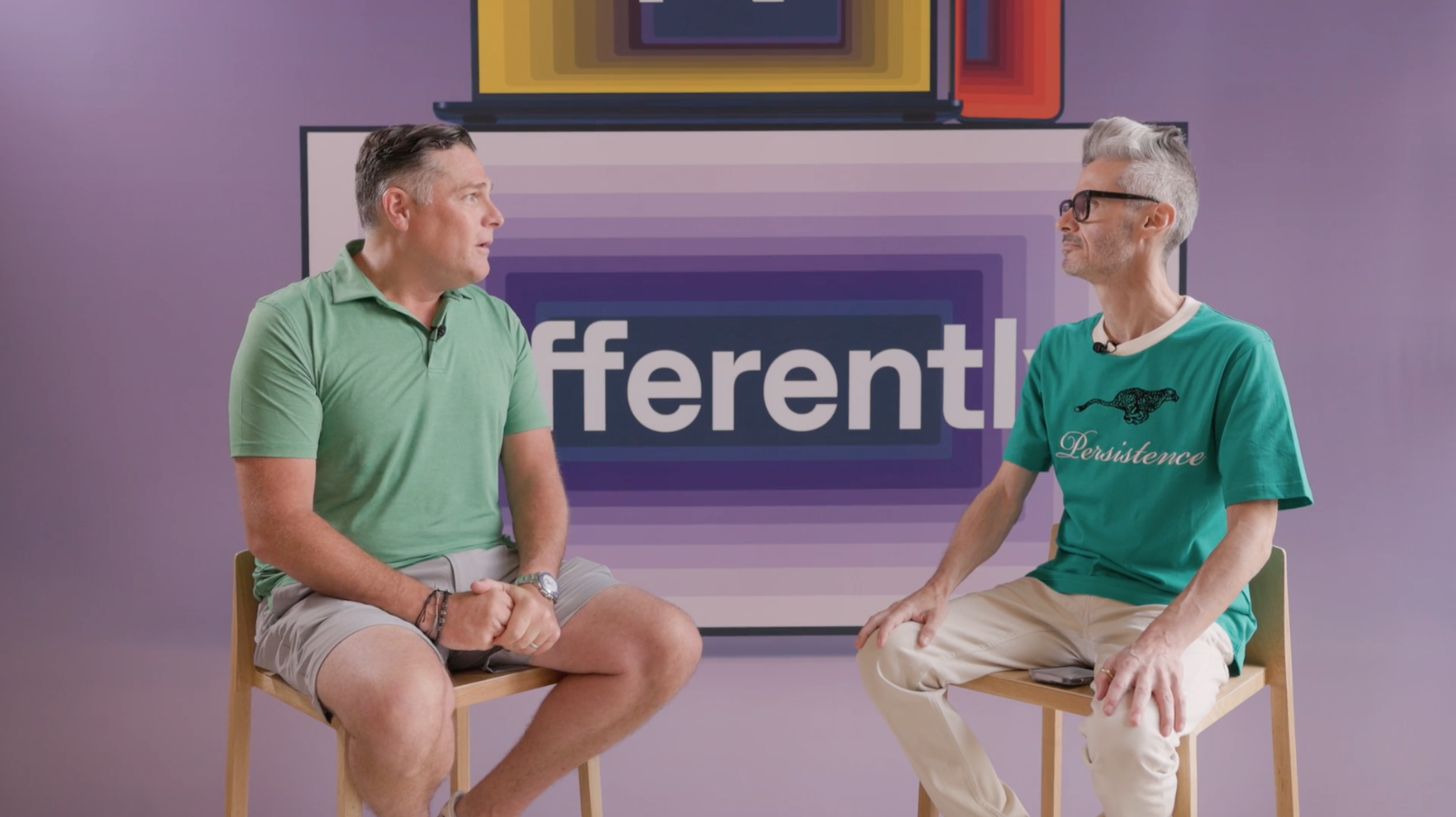My Friend, The Brain
Media Cartographer Evan Shapiro chats with Qonsent CEO Jesse Redniss in this episode of Big Data Brains.

In this episode of Big Data Brains, Media Cartographer Evan Shapiro sits down with Jesse Redniss, CEO and co-founder of Qonsent (soon-to-be Precise.ai), to talk about the importance of permission marketing and what Redniss envisions for the future.
Evan Shapiro: I’m here with Jesse Redniss, who is the founder of Qonsent. What the heck is Qonsent?
Jesse Redniss: Qonsent is a fully permissions, user experience, data interface. So we help brands think through their user experiences so they can get complete trust and transparency and permission from the consumer as they're collecting data from that consumer to use for marketing purposes, ad sales purposes, personalization, etc..
Evan Shapiro: When I first started talking to you about Qonsent, you introduced me to the idea or the phrase of permission marketing. Why do you think permission marketing is the future of advertising?
Jesse Redniss: When we look at the pressure that privacy is putting in on enabling consumers to just have choice, agency over how their data gets used, it becomes such a powerful component in regards to building actual trust, relationship, long term value with that consumer.
And so today as we're looking across the landscape, so many different components of what's happening with your data, the consumer has no idea it's actually really happening. In the press lately, it's been a lot of, focus in on auto manufacturers selling their telemetry data to insurance companies. And the consumer had absolutely no idea. Right. It's GPS… [the consented to it] unwillingly, as part of a 90 page privacy policy, terms of service, maybe they checked a box, maybe they didn't.
So again, having agency and knowing exactly what's happening with your information, your precious information, is really important. So many inferences can happen from that. And so to protect the consumer, to enable the surprise and delight, as everyone loves to say, but the value, the benefit to the consumer of how it actually happens does nothing but engender just a better relationship between the brand and the consumer.
Evan Shapiro: My thesis is, if you ask permission of the consumer to collect their data on specific data points around their lives, they'll actually give you more data than you can collect on your own.
Jesse Redniss: All the data that we've seen has actually shone and proven that. It’s that when you are actually transparent with them, upfront with them, it's not so much that they’re like, “oh no, I don't want to do that.”
It is like, “oh, thank you for actually telling me the truth on what's happening here.” And we see the propensity to increase data sharing over time when you do that.
Evan Shapiro: Especially when you explain why. So this is, “we're going to show you ads that are more relevant. We're going to personalize your experience based on the data that you give us.” The consumer rides along on that.
Jesse Redniss: It rides along with that. And I think society is built on that. At the end of the day, it's just human nature to be like, “hey, we're having a real conversation here. What you say, you're somebody I trust, I'm going to take it with a little bit more trust than somebody else,” and you build a long term relationship, human to human. That's just a fundamental right that every consumer should have, quite frankly.
Evan Shapiro: Yeah, and I think that's where we're moving from web 2.0 to web 3.0. And especially when you look at consumers who are from generation Y, generation Z, generation A, I think there's going to be an expectation of, I'm not just checking a box on a 90 page terms and conditions – I really want to know what you're doing with my data, and I want some kind of exchange of value.
Jesse Redniss: That's right. And if you make it dynamic, if you make it in the moment, make it part of the consumer journey, then it doesn't become a legal chore, right? It just becomes part of the experience.
Evan Shapiro: Gamify it a little bit.
Jesse Redniss: Actually, behavioral science and gamification actually work.
Evan Shapiro: So, just to shift gears to kind of business, for a second. You recently agreed to merge, be acquired or kind of combined with a company called Precise AI? Why?
Jesse Redniss: So, actually sitting down with Adam Helfgott, one of the founders of Vallance, which is more of a blockchain identity, permission rail and proof of providence company.
We just immediately hit it off, in regards to where we saw the future of not just the open web, but just of digital interactions going in general. And so walking Adam through the entire Quonsent platform, how we built our permissioned ledger, into the overall interface, dynamically and enabling consumers to choose. You know, synapses started firing and we started having much deeper conversations around, really, how does this help enable just every component for marketing and advertising side? The ad-sell side? Really think about, fully permissioned, proof of providence, utilization of data, in a federated way, so that you don't have to move data, you don't have to copy data. You can actually keep it in a federated system where it lies, bring models of insights to all the data and bring that back-end then for activation.
And you know, when we really think about the notion of what we're seeing in the internet right now, OpenAI is starting to literally pay participants for access to their content, access to their written content. We're like, you know what? Consumers can benefit as well. You know, at the end of the day here, they are the entire bedrock of how the entire industry actually works and operates.
And I think that you had a great article the other week that was really around – it's no longer “content is king.” It's audience. And I fully believe that from the very start. Fandom is power and we can actually make fans part of how that business operates. <agic happens.
Evan Shapiro: And I think you see that on platforms like Patreon on and other areas, like the consumer wants to be an active participant. I love the idea of a permissioned ledger. I think that's a brilliant phrase.
Take it out five years, right. So you guys are growing, you're infiltrating and becoming white label generation marketing for publishers and brands and things like that. Where do you see, in a utopia, if things go well, how does permission marketing change the ecosystem for the consumer and the advertisers?
Jesse Redniss: We really see it as value attribution. When your data, your relationship with the consumer is better, then your data is going to get utilized more as part of these federated learning networks. So as we bring models to all the different nodes – let's say Evan, you're bringing your relationships, and I'm bringing my relationships, and we're bringing them all together to actually do audience segment creation to go now, bring something out to market.
And brands are finding that the audiences that you're bringing are just far more attractive to them because they actually drive outcomes, attribution, whatever it may be. And the way that we're really thinking about the data that's being utilized as part of these systems and optimizing these audience segments, kind of points towards those value attribution models.
What is it about each one of those data points that's really driving the outcome you're looking for? You're tuning your models and everybody's models are different, right? And that's really where we see the internet today. Everyone's like, “oh, it's media mix modeling.” – “No, it's multi-touch attribution” – “No it's this, I want outcomes, I want this.” – Everyone has their own way of thinking about how they're utilizing omnichannel marketing, omni channel advertising.
And I think five years out from now, people are going to be really customizing how they're using their data, how they're using their audiences, how they're using their content strategies to get the exact business model that they want. They should be able to work with businesses that are providing the data that help them get the exact data they want, and consumers that help do that as well.
And so we really see the ability to actually provide payment rails systems back towards those originators as proof of incredible pieces of data that actually drove the outcomes you were looking for.
Evan Shapiro: I think that's really spot on for where the industry is headed. I like to call this new era that we're in the “user-centric” era. Put the user at the center of everything that you do.
If you're a big brand out there or you are a publisher out there, what piece of advice would you give them as they start to consider permission marketing, as part of their operation?
Jess Redniss: We've both been in industry for a really long time. Years ago I participated with USA Network, building out a campaign called “Characters Welcome.” And as we did that, a big notion of how we started really changing our mindset on not just putting shows out, but bringing fans in, we launched a whole platform, and that kind of set the bedrock for how I've been thinking about and approaching the marketplace ever since.
So I really think brands, as they go to market, really need to be creating with consumers, no matter what they do. That has everything to do with the creator journey, the consumer journey, the content that you're actually asking them to engage with, and then your advertising at the end of the day. So if you are thinking about the consumer and activating them within your narratives the entire time, I think you're going to win at the end of the day.
Evan Shapiro: Yeah, I agree totally. [You’ve’] always seen around corners. And so I feel like you're right on the edge of where this is all headed. Congratulations on the new deal. Let's go get some rosé.
Jesse Redniss: Let's do it.

